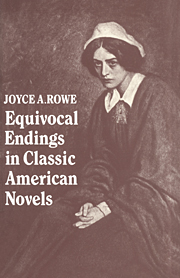 Equivocal Endings in Classic American Novels
Equivocal Endings in Classic American Novels Book contents
- Frontmatter
- Contents
- Acknowledgments
- Introduction
- 1 Nathaniel Hawthorne: “My Kinsman, Major Molineux”: The Several Voices of Independence
- 2 Bleak Dreams: Restriction and Aspiration in The Scarlet Letter
- 3 Mark Twain's Great Evasion: Adventures of Huckleberry Finn
- 4 Strether Unbound: The Selective Vision of Henry James's Ambassador
- 5 Closing the Circle: The Great Gatsby
- Conclusion: Moby-Dick and Our Problem with History
- Notes
- Index
4 - Strether Unbound: The Selective Vision of Henry James's Ambassador
Published online by Cambridge University Press: 17 August 2009
- Frontmatter
- Contents
- Acknowledgments
- Introduction
- 1 Nathaniel Hawthorne: “My Kinsman, Major Molineux”: The Several Voices of Independence
- 2 Bleak Dreams: Restriction and Aspiration in The Scarlet Letter
- 3 Mark Twain's Great Evasion: Adventures of Huckleberry Finn
- 4 Strether Unbound: The Selective Vision of Henry James's Ambassador
- 5 Closing the Circle: The Great Gatsby
- Conclusion: Moby-Dick and Our Problem with History
- Notes
- Index
Summary
And the wasting of life is the implication of death.
NotebooksAt the close of this elegiac novel, whose theme of the unlived life seemed to haunt James throughout his own, Lambert Strether cuts his last tie to his Paris adventure by extricating himself from the spell of Maria Gostrey's domestic warmth. Sitting at her breakfast table with his eye on a “ripe round melon,” he announces that he is not “in real harmony with what surrounds me.” Since Miss Gostrey has just offered to make her home a “haven of rest” for him, the comment, at the least, might be taken as a gentleman's excuse for rejecting what amounts to a lady's marriage proposal. Indeed, James says in the preface that he never had any intention of allowing Strether to take the invitation seriously. Rather, he wanted this scene “to express as vividly as possible certain things quite other than itself” – and so it does. For, on a deeper level of meaning, Strether's rejection of Miss Gostrey's offer completes our sense of the very “mould” of the New Englander's consciousness – those things of “fixed and appointed measure” in his nature which are now seen to define him and to determine his peculiar destiny.
Strether claims that he must leave Paris in order “to be right.” “Not, out of the whole affair, to have got anything for myself” (p. 344).
- Type
- Chapter
- Information
- Equivocal Endings in Classic American NovelsThe Scarlet Letter; Adventures of Huckleberry Finn; The Ambassadors; The Great Gatsby, pp. 75 - 99Publisher: Cambridge University PressPrint publication year: 1988


